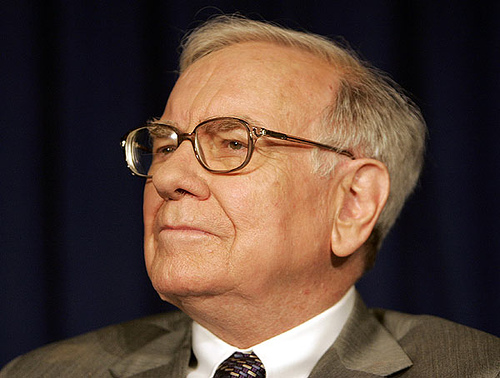 The wise man responsible for all those Geico ads may not be so wise when it comes to climate issues.Photo: JavierBillionaire investor Warren Buffett appears seriously confused about the risks posed by greenhouse gases. Two years ago, the sage of Omaha wrote, “Doubling the carbon dioxide we belch into the atmosphere may far more than double the subsequent problems for society.” Duh.
The wise man responsible for all those Geico ads may not be so wise when it comes to climate issues.Photo: JavierBillionaire investor Warren Buffett appears seriously confused about the risks posed by greenhouse gases. Two years ago, the sage of Omaha wrote, “Doubling the carbon dioxide we belch into the atmosphere may far more than double the subsequent problems for society.” Duh.
But now the AP reports:
Berkshire Hathaway shareholders rejected a measure that would have required the company’s utilities to set goals for reducing greenhouse-gas emissions.
At the company’s annual meeting on Saturday, several people spoke in favor of the measure, saying Warren Buffett’s company could be hurt financially by potential liabilities associated with carbon emissions. Berkshire owns several utilities through its MidAmerican Energy Holdings subsidiary.
Investment manager Bruce Herbert of Newground Social Investment says investors should be concerned.
Buffett and Berkshire’s board, which collectively controls 38 percent of the voting power, opposed the measure, so it was overwhelmingly rejected.
Buffett says he doesn’t believe greenhouse gases represent a material risk for Berkshire’s insurance operations. And Berkshire’s major utilities are governed by state regulators who might object to changing sources of electricity, he said.
I’d love to find out exactly what he said, if anybody knows someone who was there. I can’t find any more details on the web.
The utility excuse is just lame. Yes, utilities are subject to regulators, but the regulators are heavily influenced by the wishes of the utility — and a combination of efficiency, demand response, wind (and other renewables), and some storage and natural gas can sharply reduce GHGs without raising bills, especially when phased in over extended period of time, which is the point of the shareholder measure.
Buffett is famously a long-term investor and it’s hard to imagine a graver long-term risk than GHGs. Other insurance companies understand the risk, like Munich Re:
Floods in central Europe, wildfires in Russia, widespread flooding in Pakistan. The number and scale of weather-related natural catastrophe losses in the first nine months of 2010 was exceptionally high … Munich Re emphasises the probability of a link between the increasing number of weather extremes and climate change.
Globally, 2010 has been the warmest year since records began over 130 years ago, the ten warmest during that period all falling within the last 12 years. The warmer atmosphere and higher sea temperatures are having significant effects. Prof. Peter Höppe, Head of Munich Re’s Geo Risks Research/Corporate Climate Centre: “It’s as if the weather machine had changed up a gear. Unless binding carbon reduction targets stay on the agenda, future generations will bear the consequences.”
Buffett’s 2009 New York Times op-ed “The Greenback Effect” makes clear he understands global warming is nonlinear — and thinks enough people might understand that point so he can use it as a springboard for discussing monetary policy:
In nature, every action has consequences, a phenomenon called the butterfly effect. These consequences, moreover, are not necessarily proportional. For example, doubling the carbon dioxide we belch into the atmosphere may far more than double the subsequent problems for society. Realizing this, the world properly worries about greenhouse emissions.
[Yes, Buffett may be confusing CO2 emissions with CO2 concentrations — join the club — but it’s impossible to tell from this short hit.]
So now we are back to questioning Buffett’s sagacity on this crucial issue.



